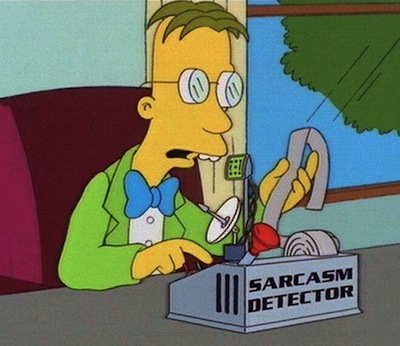Science Fiction
Dictionary
A B C D E F G H I J K L M N O P Q R S T U V W X Y Z
DARPA's Sarcasm Detector Totes Gets Your Drift

Our friends at DARPA (Defense Advanced Research Projects Agency) totally get that you're not being serious. At least when they're using their new sarcasm detector.
As they explain in a study published in the journal, Entropy, Garibay and UCF PhD student Ramya Akula have built “an interpretable deep learning model using multi-head self-attention and gated recurrent units. The multi-head self-attention module aids in identifying crucial sarcastic cue-words from the input, and the recurrent units learn long-range dependencies between these cue-words to better classify the input text.”
Fans of science fiction movies like Interstellar are already familiar with artificially intelligent robots who not only understand sarcasm, but can dish it out. Like TARS, seen below.
"With the high velocity and volume of social media data, companies rely on tools to analyze data and to provide customer service. These tools perform tasks such as content management, sentiment analysis, and extraction of relevant messages for the company’s customer service representatives to respond to," UCF Associate Professor of Industrial Engineering and Management Systems, Dr. Ivan Garibay, told Engadget via email. "However, these tools lack the sophistication to decipher more nuanced forms of language such as sarcasm or humor, in which the meaning of a message is not always obvious and explicit. This imposes an extra burden on the social media team, which is already inundated with customer messages to identify these messages and respond appropriately."
It's also an important part of popular culture, like the Sarcasm Detector in The Simpsons.

(Sarcasm detector from The Simpsons)
Computer scientists have actually been working on this problem for quite some time, see these articles:
- SASI Sarcasm Recognition A Really Useful Invention (2010)
The efficiency of their sarcasm detector is about 77 percent. - Twitter Sarcasm Detected By Computer (2016)
Decontextualized sarcasm is a matter of great concern, and Carnegie Mellon researchers have taken it very seriously.
Scroll down for more stories in the same category. (Story submitted 5/13/2021)
Follow this kind of news @Technovelgy.| Email | RSS | Blog It | Stumble | del.icio.us | Digg | Reddit |
Would
you like to contribute a story tip?
It's easy:
Get the URL of the story, and the related sf author, and add
it here.
Comment/Join discussion ( 0 )
Related News Stories - (" Artificial Intelligence ")
Grok Scores Best In Psychological Tests
'Try to find out how he ticks...' - Isaac Asimov, 1941.
Google's Nano Banana Pro Presents Handwritten Math Solutions
'...copy was turned out in a charming and entirely feminine handwriting.' - Isaac Asimov (1949)
Woman Marries Computer, Vonnegut's Dream Comes True
'Men are made of protoplasm... Lasts forever.' - Kurt Vonnegut
ChatGPT Now Participates in Group Chats
'...the city was their laboratory in human psychology.'
Technovelgy (that's tech-novel-gee!) is devoted to the creative science inventions and ideas of sf authors. Look for the Invention Category that interests you, the Glossary, the Invention Timeline, or see what's New.
Science Fiction
Timeline
1600-1899
1900-1939
1940's 1950's
1960's 1970's
1980's 1990's
2000's 2010's
Current News
The New Habitable Zones Include Asimov's Ribbon Worlds
'...there's a narrow belt where the climate is moderate.'
Can One Robot Do Many Tasks?
'... with the Master-operator all you have to do is push one! A remarkable achievement!'
Atlas Robot Makes Uncomfortable Movements
'Not like me. A T-1000, advanced prototype. A mimetic poly-alloy. Liquid metal.'
Boring Company Drills Asimov's Single Vehicle Tunnels
'It was riddled with holes that were the mouths of tunnels.'
Humanoid Robots Tickle The Ivories
'The massive feet working the pedals, arms and hands flashing and glinting...'
A Remarkable Coincidence
'There is a philosophical problem of some difficulty here...'
Cortex 1 - Today A Warehouse, Tomorrow A Calculator Planet
'There were cubic miles of it, and it glistened like a silvery Christmas tree...'
Perching Ambush Drones
'On the chest of drawers something was perched.'
Leader-Follower Autonomous Vehicle Technology
'Jason had been guiding the caravan of cars as usual...'
Golf Ball Test Robot Wears Them Out
"The robot solemnly hit a ball against the wall, picked it up and teed it, hit it again, over and again...'
Boring Company Vegas Loop Like Asimov Said
'There was a wall ahead... It was riddled with holes that were the mouths of tunnels.'
Rigid Metallic Clothing From Science Fiction To You
'...support the interior human structure against Jupiter’s pull.'
Is The Seattle Ultrasonics C-200 A Heinlein Vibroblade?
'It ain't a vibroblade. It's steel. Messy.'
Roborock Saros Z70 Is A Robot Vacuum With An Arm
'Anything larger than a BB shot it picked up and placed in a tray...'
A Beautiful Visualization Of Compact Food
'The German chemists have discovered how to supply the needed elements in compact, undiluted form...'
Bone-Building Drug Evenity Approved
'Compounds devised by the biochemists for the rapid building of bone...'
